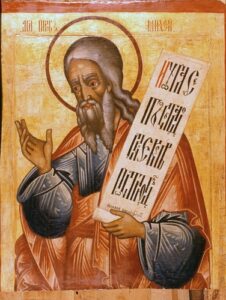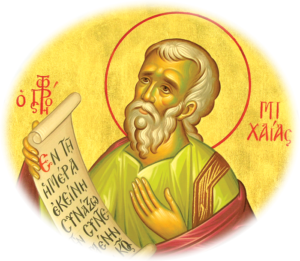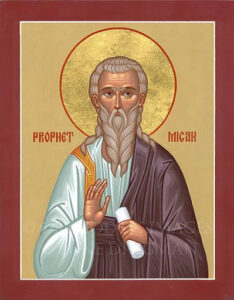Holy Prophet Micah – Aug 14

The Prophet Micah, the sixth of the Twelve Minor Prophets, was Moreshtite, descendant from the tribe of Judah, a native of the small village of Moresheth, near Gath (Jer. 26: 18; Micah 1:1). His name is a shortened version of Micaiah, which means ‘who is from God’. His prophetic service began around the year 778 before Christ and continued for almost 50 years under the kings of Judah: Jotham, Ahaz, and Righteous Hezekiah (721-691 B.C.). He was a contemporary with the Prophets Isaiah, Amos, and Hosea. Micaiah is not the one who was the son of Imlah, (1 Kings 22: 8), who censured Ahab and was murdered by Ahab’s son Joram, who reigned the ninth century before Christ. His book, written before 720 BC, is a prophetical book, divided into seven chapters. He prophesied the New Covenant, the Incarnation (1: 3), Christ’s birth in Bethlehem (5: 2), Christ’s suffering, the Church and its persecution, conversion of Gentiles and finally a time of peace.
Micah was known as the prophet of the poor and the herald prophet. His Prophecies alternates between God’s sternness and His Kindness, between God’s destruction of evil doers and His goodness to the faithful. Micah’s prophecy announces judgement not for specific time or place, but all the time, for all the people. His oracle against two earthly cities – Samaria and Jerusalem, which are icons for mankind, with rebellious and sinful inhabitants. Those in Samaria have forgotten to worship the One True God and have resorted to idols worship and those in Jerusalem practice and worship in God’s house, but with sinful hearts.
He stresses that God hates idolatry, injustice, rebellion, and empty ritualism, but delights in pardoning the penitent. As he lived border town, largely agricultural part of the country, between Philistia and Judah, about twenty-five miles from Jerusalem. Micah lived among the poor people and sympathized with them because of their hard lot. Thus, he had a strong concern for the lowly and less fortunate of society — the lame, the outcasts, the grieving, and the afflicted (4: 6). Therefore, Micah directed much of his prophecy toward the powerful leaders of Samaria and Jerusalem, the capital cities of Israel and Judah, respectively (Micah 1:1).

Micah is usually classified with the minor prophets, but his work was evidently held in high esteem by later prophets and teachers. Micah prophesied during the momentous years surrounding the tragic fall of Israel to the Assyrian Empire (722 BC), an event he also predicted (1: 6). Micah stated in his introduction to the book that he prophesied during the reigns of Jotham, Ahaz, and Hezekiah in Judah, failing to mention the simultaneous string of dishonourable kings that closed out the northern kingdom of Israel. This was the period, when Israel was imploding from the effects of evil and unfaithful leadership, Judah seemed on a roller-coaster ride—ascending to the heights of its destiny in one generation, only to fall into the doldrums in another. In Judah at this time, good kings and evil kings alternated with each other, a pattern seen in the reigns of good king Jotham (2 Kings 15:32–34); evil Ahaz (2 Kings 16:1–4); and good Hezekiah (2 Kings 18: 1–7). Much of Micah’s indictment against Israel and Judah involves these nations’ injustice toward the lowly—unjust business dealings, robbery, mistreatment of women and children, and a government that lived in luxury off the hard work of its nation’s people. Micah, like prophet Amos, also rebuked Israel because of dishonesty in the marketplace and corruption in government. He warned the people, on behalf of God, of pending destruction if ways and hearts were not changed. He told them what the LORD requires of them: He hath shewed thee, O man, what is good; and what doth the LORD require of thee, but to do justly, and to love mercy, and to walk humbly with thy God? (Micah 6: 8)

Micah’s book can also be said to revolve around two significant predictions: one of judgment on Israel and Judah (Micah 1: 1 – 3: 12), the other of the restoration of God’s people in the millennial kingdom (4:1–5:15). Judgment and restoration inspire fear and hope, two ideas wrapped up in the final sequence of Micah’s prophecy, a courtroom scene in which God’s people stand trial before their Creator for turning away from Him and from others (6: 1– 7: 20). In this sequence, God reminds the people of His good works on their behalf, how He cared for them while they cared only for themselves. The book of Micah concludes with the prophet’s call on the Lord as his only source of salvation and mercy (7: 7), pointing the people toward an everlasting hope in their everlasting God, rather than leave God’s people with the fear and sting of judgment.
Micah wrote of the Messiah who was to come, foretelling his birthplace, lineage, and origin, as well as his future reign. Prophet Micah provides one of the most significant prophecies of Jesus Christ’s birth in all the Old Testament, pointing some seven hundred years before Christ’s birth to His birthplace of Bethlehem and to His eternal nature. “But you, Bethlehem Ephrathah, though you are small among the clans of Judah, out of you will come for me one who will be ruler over Israel, whose origins are from of old, from ancient times” (Micah 5: 2).
He will stand and shepherd His flock in the strength of the LORD, in the majesty of the Name of the LORD his God. And they will live securely, for then His greatness will reach to the ends of the earth. (Micah 5: 4)

0 Comments